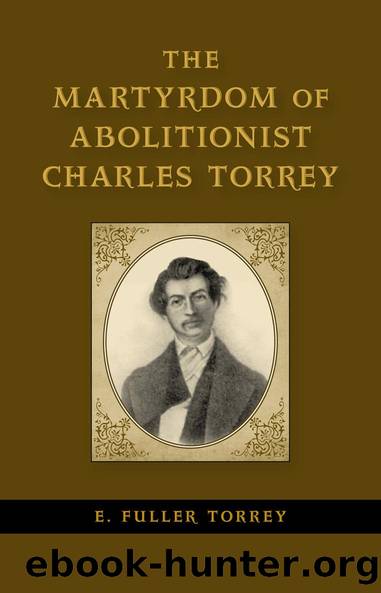The Martyrdom of Abolitionist Charles Torrey by E. Fuller Torrey

Author:E. Fuller Torrey [Torrey, E. Fuller]
Language: eng
Format: epub
Tags: Social Science, Slavery, History, United States, State & Local, South (AL; AR; FL; GA; KY; LA; MS; NC; SC; TN; VA; WV)
ISBN: 9780807152331
Google: nW3wAAAAQBAJ
Publisher: LSU Press
Published: 2013-11-06T05:41:37+00:00
We saw him a few months previous to his arrest, and he talked as freely of his plans of running the âunderground railroadâ as he termed it, as though it was attended by no danger, and coupled with no violation of the law. We earnestly but kindly remonstrated with him. We pointed out the dangers and difficulties of the experiment. We admonished him that he was violating what every citizen was bound to protect. We appealed in behalf of the wife he loved and the friends who love him. But it was all in vain. He was fearless of consequences and apparently ready and willing to become a martyr to the cause. It was with a heavy heart that we parted with him on that occasion; for we well feared what must be the consequence of his daring and reckless career. And when, a short time afterwards, we heard of his arrest, it occasioned a good deal more of sorrow than surprise.
Daniel A. Payne, the first black bishop of the African Methodist Episcopal Church and later a university president, also tried to warn Torrey: âI was personally acquainted with Torrey, and had repeatedly warned him not to come to Baltimore or Washington. Having learned of the plot against him, I made it known to his friend, Dr. J. J. G. Bias, of Philadelphia, where he always stopped, and wrote him myself, advising him not to come. The warnings were unheeded. The idea of liberty consumed him.â32
Despite the warnings and obvious dangers, Torrey continued making trips from Philadelphia to Maryland and Virginia to rescue slaves. He avoided Washington, given his recent experience there, but instead focused his efforts on Baltimore and rural Virginia. Financing for these forays was furnished by his friends in Philadelphia and probably also by Gerrit Smith.
In early December, Torrey went by carriage through Gettysburg and Harpers Ferry to Winchester. Emily Webb, a former slave who had purchased her freedom, had approached Torrey in Philadelphia and asked his help in freeing her husband and five children, who were owned by Bushrod Taylor, a slave dealer, in Winchester. Taylor had already sold two of her other children south. It was later alleged in court proceedings that Torrey stayed at a hotel in Winchester on December 9 under the name of âC. Turner.â With the assistance of John Fountain, a free black in Winchester, who made the arrangements, Torrey met John Webb and his five children at a previously appointed spot, and they immediately started north. According to Torreyâs account, they reached Chambersburg, Pennsylvania, âin 23 hours from Winchester over more horrible roads than I ever had the misfortune to travel ⦠a combination of mud and rocks.â They were pursued by two slave catchers from Winchester and a sheriff from Maryland; the pursuers reached Chambersburg âonly four hours after we left for Philadelphia.â From there, the Webbs fled to Canada. Fountain was imprisoned for ten weeks âunder suspicion of having aided Torrey.â33
For the next six months, Torrey traveled widely and continued to transport slaves north.
Download
This site does not store any files on its server. We only index and link to content provided by other sites. Please contact the content providers to delete copyright contents if any and email us, we'll remove relevant links or contents immediately.
| United States | Abolition |
| Campaigns & Battlefields | Confederacy |
| Naval Operations | Regimental Histories |
| Women |
In Cold Blood by Truman Capote(3375)
The Innovators: How a Group of Hackers, Geniuses, and Geeks Created the Digital Revolution by Walter Isaacson(3157)
Steve Jobs by Walter Isaacson(2889)
All the President's Men by Carl Bernstein & Bob Woodward(2369)
Lonely Planet New York City by Lonely Planet(2218)
And the Band Played On by Randy Shilts(2197)
The Room Where It Happened by John Bolton;(2151)
The Poisoner's Handbook by Deborah Blum(2135)
The Innovators by Walter Isaacson(2098)
The Murder of Marilyn Monroe by Jay Margolis(2095)
Lincoln by David Herbert Donald(1982)
A Colony in a Nation by Chris Hayes(1927)
Being George Washington by Beck Glenn(1921)
Under the Banner of Heaven: A Story of Violent Faith by Jon Krakauer(1789)
Amelia Earhart by Doris L. Rich(1690)
The Unsettlers by Mark Sundeen(1682)
Dirt by Bill Buford(1671)
Birdmen by Lawrence Goldstone(1662)
Zeitoun by Dave Eggers(1643)
